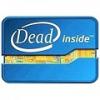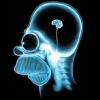Right, I'm back on NSI-189, just trialled two days worth of 20 mg per day, and today is the first day of trialling 20 mg x2 per day = 40 mg per day.
It'll be a short trial though, because I only have Modafinil worth of 4 days, and without it, I'll definitely go really tired or more anxious.
Stack:
NSI-189 - 40 mg
Modafinil - 150 mg
Omega-3 EPA - 930 mg
Omega-3 DHA - 660 mg
Zink-Citrate - 30 mg (elemental)
Magnesium Citrate - 60 mg
Magnesium Lactate - 3000 mg
(360 mg elemental in total)
Maybe not directly, but i thought they will sonner or later shrink your hippocampus.
Agreed but fixing the hippocampus without fixing the cuasing coefactor is the equivalent of bailing water from a sinking ship, if you can't stop the source the NSI-189 is nothing more then a stop gap messure.
Just my opinion, but one must address the cause and repair the damage simultaneously, in order to fix resistant cases of depression almost more times then not. If long lasting postive results are to be expected in the outcome of the patient's own treatment,then people must stop thinking so one dimensional about depression.
You forgot one of THE biggest reasons for getting depression:
Neuropsychiatric disorder.
You can get depressed in the modern world, EASILY, if you have alterations to your basic neural circuitry, altering your environmental response. Society is built to fit the majority, so if you deviate from the expected behavioural norm, you're going to get into trouble.
Depending on your environment, and the severity of your disorder, then ALL of these disorders will make you depressed in the long run:
Autism
ADHD
SCT
Borderline (yes, BPD is such a disorder - read up on the newest data)
Dyscalculia
Dyslexia
Schizoid Personality Disorder (WHY is this called a PD?? We KNOW it's a form of Schizo! Jesus...)
Schizotypal Personality Disorder (AGAIN... WHY hold on to the old PD-label?? IDIOTIC!!)
Idiopathic Hypersomnia (narcolepsy 'lite')
Let's say at least 25% of those people will eventually be struck by some form of depression as a result of extreme environmental pressure - then, my friend, you will end up with a significant proportion of all people seeking help for depressive symptoms, and being put on antidepressants.
Coming back to what you said about treating the underlying causes, ADHD is a great example here - As you're probably aware, traditional stimulants have FAILED to meet the end-point results in many, many AD-trials - BUT...! Not so when it comes to ADHD-ers - all of a sudden, compounds which usually cause depressive symptoms in the long run, and SIGNIFICANT anxiogenic symptoms, are all of a sudden anti-depressive and anxiolytic! The improvement to an ADHD-ers mood is often dramatic, following the start of treatment with Stimulant-therapy.
So yes, I definitely agree with treating the underlying causes - however, there's another aspect to this - sometimes a depressed patient is so badly ravaged, so far gone, that for him or the Dr's to try and find the underlying cause is simply not feasible - one MUST begin by draining all of that water from the ship, or it'll sink in a matter of minutes!
Hence, one goes on an antidepressant, which gives the patient the ability to start pondering exactly why the patient is actually so ill.
Edited by Stinkorninjor, 26 December 2016 - 10:44 AM.































































